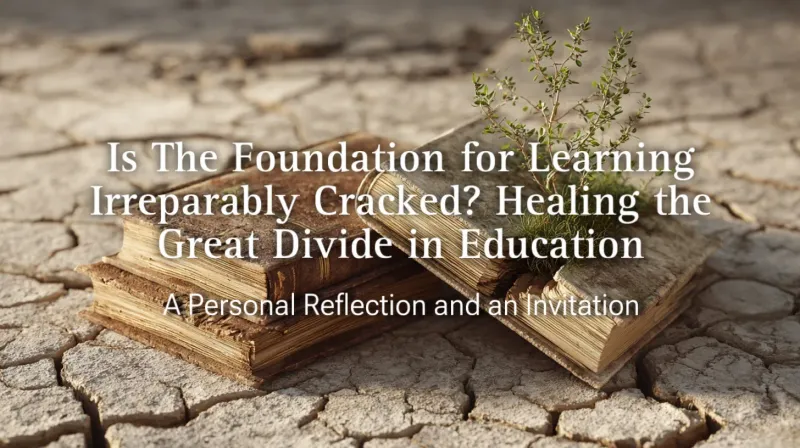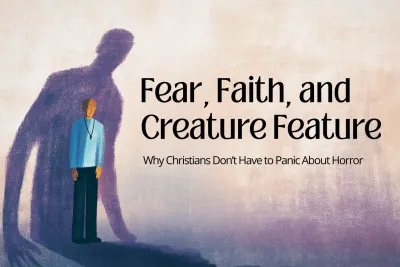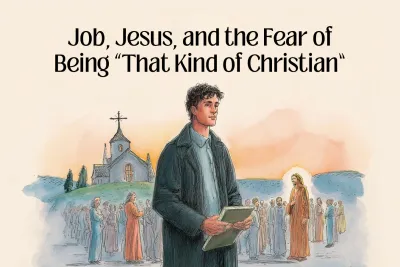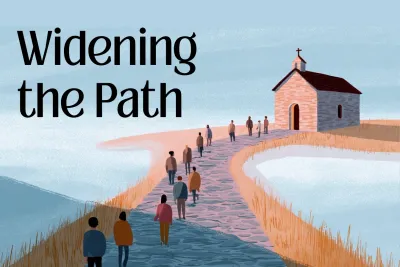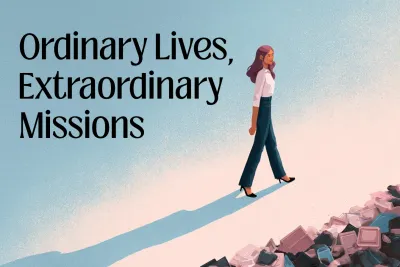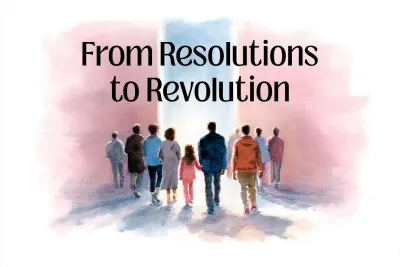Is The Foundation for Learning Irreparably Cracked??
Dear Friends,
If you’ve been on this journey with me—whether through reading my trilogy, participating in the Royal Falcon Foundation’s youth leadership work, joining us at Hillcrest Orchard Camp, or engaging with the “Created in the Image of God: Building Vibrant Communities” project—you know that I’ve spent much of my life circling around one persistent question:
What kind of education actually brings us alive, connects us, and helps us build communities that flourish, in body, mind, and spirit?
Growing up, I—like nearly everyone in America—passed through public schools. These classrooms, for the most part, focused on getting the essentials right: reading, writing, math, science, maybe a little history or civics thrown in. The promise was that if we all started from the same “neutral ground,” every child—no matter their background or creed—could thrive.
But over the years, I’ve watched that sense of common purpose fray. What began, back in the 1960s, as talk of a “generation gap” has—decade by decade—become, for many Americans, a canyon. Where schools once tried to sidestep the deeper questions, today they often find themselves at the center of debates about identity, values, and what beliefs should shape the minds and hearts of the next generation.
It’s not just about what subjects to teach or how to prepare for college. It’s about whether there’s such a thing as a shared foundation at all.
Encountering the Other Stream: Spiritual Education
At the same time, another part of my life’s story was unfolding along a parallel—yet very different—track. My earliest taste of what I’ll call spiritual education didn’t happen behind a desk, but outdoors at church youth camps in the wilds of Alaska and Minnesota. Around campfires, on long hikes, and even in moments of silence, the lessons went beyond academics: they aimed to shape character, to build virtue, and to point us to deeper purpose and belonging.
This “education of the soul” reached its clearest expression during my undergraduate years at Ambassador College. There, everything—from science lectures to community service—was anchored by an unapologetic motto:
“The Word of God is the Foundation of Knowledge.”
For me, this was not just an institutional catchphrase, but a guiding star. It challenged me to see learning not as the stacking up of facts or the slog for credentials, but as a return—a journey, as the Beatles once sang, to “get back to where we once belonged.” It set me on a path to seek, always, the integration of mind and soul.
The Widening Canyon—and a Quiet Plea for Wholeness
Today, these two streams—secular schooling and spiritual formation—flow side by side but rarely touch. Public schools strive for neutrality, yet can hardly avoid the values and beliefs that inevitably seep in (often contested, always evolving). Meanwhile, communities and families who seek a spiritual foundation must often do so at the margins, or in private, longing for something more interconnected.
This is not just an intellectual divide—it’s the backdrop for many of our nation’s most personal and passionate debates. Is education about job skills, or about shaping the whole person? Is it enough to remain “neutral” on ultimate questions, or do we inevitably risk passing along a different set of dogmas—ones that may just carry the weight of new orthodoxies, but without the language or rituals that bind us together? Who gets to decide what children are shown, taught, or shielded from?
For many, these questions bring anxiety, or even grief. For others, they represent long-overdue progress toward inclusion and diversity. For all, they signal a moment of searching: What, if anything, can be our foundation?
‘Abdu’l-Bahá and the Promise of True Integration
When I reflect on what might heal this divide, I’m guided by the words of ‘Abdu’l-Bahá:
“Regard man as a mine rich in gems of inestimable value. Education can, alone, cause it to reveal its treasures… The root cause of wrongdoing is ignorance, and we must therefore hold fast to the tools of education.”
But he’s speaking here of an education that is much more—something both practical and spiritual, intellectual and heartfelt. He points to the dazzling potential in every soul, insisting that only a truly comprehensive education—one that speaks to our highest purposes, as well as our daily needs—can unlock it.
This wisdom has haunted my work at Royal Falcon Foundation, in Baha’i communities, and in recent years, through programs like Hillcrest Orchard Camp and exploratory networks like the “Created in the Image of God” series. Time and again, I see that our greatest successes happen when learning is not divided, but integrated—when we honor the full dignity of intellect, heart, and spirit.
What Would It Look Like to Heal the Divide?
So what if we didn’t have to choose?
What if the next era of education in America (and, indeed, globally) could be something more—an integration of the tried and true strengths of public education with the power and purpose of spiritual formation?
What if we could channel the best technology—platforms like Substack, project-based learning, and digital libraries—to create a real educational movement, built not on nostalgia or dogma, but on the shared insight that the “Word of God is the Foundation of Knowledge”—and that all knowledge, spiritual and scientific, can and should serve the upliftment of the whole person and the wider world?
This is the vision I’ve been circling toward. It’s not an answer, but an invitation.
In the Coming Weeks: Laying the Groundwork—Together
Over the next several weeks, I’ll be sharing more of the stories, lessons, and frameworks that have emerged on this path—from those earliest campfire lessons, through Ambassador College’s transformative culture, to the latest partnerships and prototypes at Royal Falcon, Hillcrest, and beyond. We’ll explore the four-part framework that, I believe, might point toward a healing of the divide—and set the table for a new, integrated educational institute.
I’ll ask:
- How did this divide become a canyon, and what have we lost along the way?
- Where do we see hope, or successful integration, already happening?
- How might a new foundation be built—one that honors both the search for knowledge and the call to meaning, both public and personal, practical and transcendent?
An Invitation to Dialogue
If this resonates with you—or challenges you—I hope you’ll join in. What is your experience of this divide? Where have you seen true wholeness? What would a truly integrated education mean for you, your family, your community?
Let’s begin the dialogue in the comments below, or reach out directly if you’d like to help build something lasting. The only way to create new common ground is to start having new kinds of conversations.
Next week, we’ll take the next step—together. —Wade Fransson
If you feel this yearning, or if you have insight or hope to add, please reply or comment below. Let’s lay the first stone of a new foundation together.

